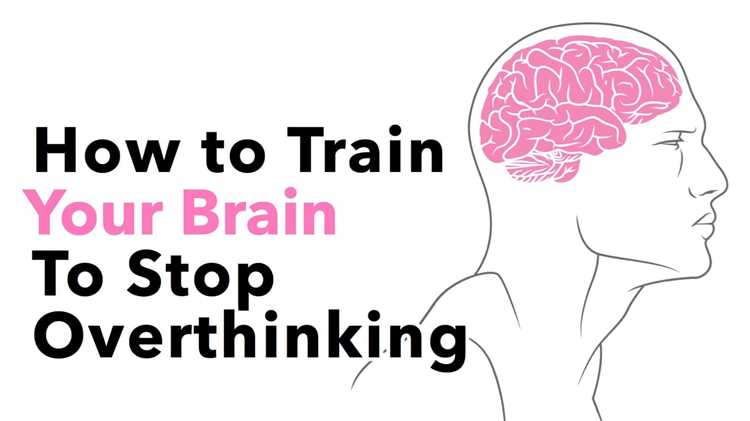Do you often find yourself trapped in a never-ending cycle of overthinking? Does your mind constantly dwell on the past or worry about the future, leaving you feeling anxious and stressed? Overthinking can be a real obstacle to achieving peace of mind and enjoying the present moment.
Fortunately, there are strategies you can implement to break free from the chains of overthinking and find tranquility. By consciously practicing these techniques, you can train your mind to let go of unnecessary thoughts and cultivate a sense of peace and calm.
One effective strategy to stop overthinking is to practice mindfulness. Mindfulness involves paying attention to the present moment without judgment. By focusing on your breath or sensations in your body, you can bring your attention back to the here and now, rather than getting caught up in endless thoughts.
Another powerful technique is to challenge your thoughts. Often, overthinking is caused by negative or irrational thinking patterns. By questioning the validity of your thoughts and replacing them with more rational and positive ones, you can break free from the cycle of overthinking.
It’s also important to take care of your physical health. Engaging in regular exercise, eating a balanced diet, and getting enough sleep can have a significant impact on your mental well-being. When your body is healthy, your mind is more likely to be calm and clear.
In addition, practicing self-compassion can help you overcome overthinking. Treat yourself with kindness and understanding, just as you would a close friend. Acknowledge that it’s normal to have thoughts and worries, but remind yourself that you have the ability to let them go and focus on the present moment.
Lastly, seeking support from others can be beneficial when it comes to stopping overthinking. Talk to a trusted friend or family member about your worries and concerns. Sometimes, simply expressing your thoughts aloud can provide a sense of relief and help you gain a fresh perspective.
Identify the Triggers
One of the first steps to stop overthinking and gain peace of mind is to identify the triggers that often lead to overthinking. Triggers can be external factors such as certain situations, people, or events, or internal factors such as negative thoughts or past experiences.
1. External Triggers:
- Social Media: Spending too much time on social media platforms, constantly comparing yourself to others, and seeking validation from likes and comments can trigger overthinking.
- Negative Environments: Being in toxic or negative environments, whether it’s a workplace or personal relationship, can lead to overthinking as you constantly analyze and worry about your actions and words.
- Uncertainty: Uncertain situations, such as job insecurity or relationship issues, can trigger overthinking as you try to anticipate and control the outcome.
2. Internal Triggers:
- Negative Thoughts: Negative self-talk, self-doubt, and belief in worst-case scenarios can fuel overthinking.
- Perfectionism: Setting unrealistically high standards for yourself and constantly striving for perfection can lead to overthinking as you obsessively analyze and criticize your actions.
- Past Experiences: Traumatic or negative experiences from the past can become triggers for overthinking as they create a fear of repeating similar situations in the future.
By identifying these triggers, you can become more aware of the situations and thoughts that lead to overthinking. This awareness will allow you to develop strategies to cope with them effectively.
Practice mindfulness
Mindfulness is a powerful tool to help stop overthinking and gain peace of mind. It involves bringing your attention to the present moment and observing your thoughts and emotions without judgment.
To practice mindfulness, you can:
- Start with deep breathing: Close your eyes, take a deep breath in, and exhale slowly. Focus on the sensation of your breath entering and leaving your body. This simple act can help calm your mind and bring you into the present moment.
- Engage your senses: Take a moment to notice your surroundings. What do you see, hear, smell, taste, and touch? Engaging your senses can help anchor you in the present moment and redirect your focus away from overthinking.
- Practice meditation: Find a quiet space and sit in a comfortable position. Close your eyes and bring your attention to your breath. Notice the sensation of your breath moving in and out of your body. If your mind starts to wander, gently bring your focus back to your breath. Start with just a few minutes of meditation and gradually increase the duration as you become more comfortable.
- Observe your thoughts: Rather than getting caught up in your thoughts, try observing them from a distance. Imagine them as clouds passing by in the sky. Notice them without judgment or attachment. This practice can help you develop a sense of detachment from your thoughts and reduce their power over you.
Practicing mindfulness regularly can help you develop a greater sense of self-awareness and strengthen your ability to stay present in the moment. Over time, it can reduce overthinking and bring greater peace of mind.
Challenge negative thoughts
One of the most effective strategies to stop overthinking and gain peace of mind is to challenge negative thoughts. Negative thoughts can often fuel overthinking and lead to unnecessary worry and anxiety. By challenging these negative thoughts, we can reframe them into more positive and realistic beliefs.
1. Identify negative thoughts: The first step is to become aware of the negative thoughts that are triggering your overthinking. Pay attention to your thought patterns and recognize when negative thoughts arise.
2. Evaluate the evidence: Once you identify a negative thought, evaluate the evidence for and against it. Ask yourself if there is any real evidence to support this thought or if it is based on assumptions or fears.
3. Reframe the thought: Take the negative thought and reframe it into a more positive and realistic belief. For example, if you have the thought “I always mess things up,” reframe it as “I am capable of making mistakes, but I also have many successes.”
4. Challenge cognitive distortions: Cognitive distortions are exaggerated or irrational thinking patterns that can contribute to overthinking. Common cognitive distortions include black-and-white thinking, overgeneralization, and personalization. Recognize when you are engaging in these distortions and challenge them with more balanced and realistic thoughts.
5. Practice self-compassion: Overthinking often stems from self-criticism and harsh self-judgment. Practice self-compassion by treating yourself with kindness and understanding. Remind yourself that everyone makes mistakes and that it is okay to not have all the answers.
6. Seek support: If you are struggling to challenge your negative thoughts on your own, don’t hesitate to seek support from loved ones or a mental health professional. They can provide guidance and help you develop healthier thought patterns.
By challenging negative thoughts, you can break free from the cycle of overthinking and gain peace of mind. It takes practice and patience, but with consistency, you can develop a healthier mindset and achieve a greater sense of calm and clarity.
Set realistic goals
Overthinking often stems from setting unrealistic goals for ourselves. When we set goals that are too high or unattainable, we put unnecessary pressure on ourselves and increase the likelihood of overthinking.
Here are some tips for setting realistic goals:
- Be specific: Clearly define what you want to achieve. Vague goals can lead to confusion and uncertainty.
- Break it down: Divide your goal into smaller, manageable tasks. This allows you to focus on one step at a time and makes the overall goal more attainable.
- Consider timeframes: Set realistic timelines for each task and the overall goal. Time constraints can help you stay focused and prevent overthinking.
- Be flexible: Recognize that circumstances may change, and it’s okay to adjust your goals accordingly. Being adaptable can reduce stress and mental strain.
- Celebrate progress: Acknowledge and celebrate your achievements along the way. This boosts motivation and helps maintain a positive mindset.
By setting realistic goals, you can help alleviate the pressure and stress that often leads to overthinking. Remember to be kind to yourself and prioritize self-care throughout the goal-setting process.
Engage in physical activity
Physical activity is not only good for your body, but it can also have numerous mental health benefits. Engaging in regular exercise can help distract your mind from overthinking and provide a healthy outlet for stress and anxiety. Here are a few ways physical activity can help you stop overthinking and gain peace of mind:
- Increased endorphin levels: Exercise releases feel-good chemicals called endorphins, which can improve mood and reduce stress. These endorphins act as natural painkillers and can help alleviate anxiety and negative thoughts.
- Distracts from overthinking: When you’re engaged in physical activity, your focus shifts from your thoughts to the movement of your body. This distraction can break the cycle of overthinking and provide a much-needed mental break.
- Reduces muscle tension: Overthinking often leads to tension and tightness in the muscles. Regular exercise can help relieve muscle tension and promote relaxation, allowing you to release physical and mental stress.
- Improves sleep: Overthinking can interfere with quality sleep, leading to fatigue and a racing mind. Engaging in physical activity can help regulate your sleep patterns, making it easier to fall asleep and stay asleep throughout the night.
- Boosts self-confidence: Overthinking can undermine your self-confidence and make you doubt your abilities. Regular exercise can help improve self-esteem and boost confidence by setting and achieving personal goals, as well as improving physical fitness.
- Social interaction: Participating in group activities or team sports provides an opportunity for social interaction, which can be beneficial for mental well-being. Interacting with others can distract from overthinking and provide a sense of belonging and support.
Whether it’s going for a run, practicing yoga, or playing a team sport, finding a physical activity that you enjoy can be a powerful tool in stopping overthinking and promoting peace of mind. Remember to listen to your body and choose activities that align with your preferences and fitness level.
Seek support from trusted individuals
When you find yourself caught in a cycle of overthinking, it can be helpful to seek support from trusted individuals. Talking to someone who understands and cares about your well-being can provide valuable perspective and help you gain peace of mind.
Here are a few ways you can seek support:
- Friends and family: Reach out to the people in your life who you trust and feel comfortable talking to. Share your thoughts and feelings with them, and allow them to offer their support and guidance.
- Therapist or counselor: Consider seeking professional help from a therapist or counselor. They are trained to help individuals overcome overthinking and anxiety. They can provide you with coping mechanisms and techniques to manage your thoughts and emotions.
- Support groups: Joining support groups or online communities can be a great way to connect with others who are going through similar struggles. Sharing your experiences and listening to others can provide comfort and reassurance.
Remember, seeking support doesn’t mean you are weak. It takes strength to recognize when you need help and to reach out to others. By leaning on trusted individuals for support, you can begin to break the cycle of overthinking and find peace of mind.
Establish a routine
One effective strategy to stop overthinking and gain peace of mind is to establish a routine. Having a consistent daily schedule can help to bring structure and organization to your life, reducing the tendency to overthink and worry.
Here are some steps you can take to establish a routine:
- Set a regular sleep schedule: Going to bed and waking up at the same time every day can help regulate your body’s internal clock and improve the quality of your sleep.
- Plan your day: Take a few minutes each morning to plan out your day. This can help you stay focused and prevent your mind from wandering and overthinking.
- Break tasks into smaller steps: If you have a big task or project, breaking it down into smaller, manageable steps can make it less overwhelming and easier to accomplish.
- Assign specific times for activities: Assign specific times throughout your day for activities such as work, exercise, leisure time, and self-care. This can help create a sense of structure and prevent overthinking.
- Include time for relaxation: Make sure to include time for relaxation and self-care in your routine. This can help reduce stress and anxiety, allowing you to gain peace of mind.
Remember, it may take some time to establish a routine and make it a habit. Be patient with yourself and make adjustments as needed to find a routine that works best for you. Stick to your routine as much as possible, but also allow for flexibility when necessary. By establishing a routine, you can create a sense of stability and reduce the likelihood of overthinking.
Embrace the present moment
One of the most effective strategies to stop overthinking and gain peace of mind is to embrace the present moment. Overthinking often stems from troubling thoughts about the past or worries about the future. By focusing on the present moment, you can redirect your thoughts and find a sense of peace and clarity.
To embrace the present moment, try the following strategies:
- Mindfulness meditation: Practice mindfulness meditation to train your mind to stay present. This involves focusing your attention on your breath or a specific sensation, and gently bringing your mind back whenever it wanders.
- Sensory grounding: Engage your senses to bring your focus back to the present. Pay attention to the sounds, smells, tastes, and textures around you. Take a moment to really notice and appreciate your surroundings.
- Engage in mindful activities: Activities such as yoga, tai chi, or going for a walk in nature can help you become more present. By focusing on the movements of your body and the sensations you experience, you can let go of overthinking and fully immerse yourself in the present moment.
- Practice gratitude: Cultivating a practice of gratitude can shift your focus from negative thoughts to the positive aspects of your life. Take a moment each day to reflect on what you are grateful for, whether it’s something small or something significant.
- Avoid multitasking: Multitasking can often lead to overthinking and a lack of focus. Try to do one thing at a time and give it your full attention. This will help you stay present and be more productive.
- Let go of control: Overthinking often comes from a desire to control everything. Practice letting go of the need for control and trust that things will work out. Accept that you cannot control everything and focus on what you can control in the present moment.
By embracing the present moment, you can break free from the cycle of overthinking and find peace of mind. Remember that the present moment is all we have, so make the most of it.
Questions and answers
How can I stop overthinking?
There are several strategies you can try to stop overthinking. One effective strategy is to practice mindfulness and become more aware of your thoughts. You can also challenge your negative thoughts and replace them with positive ones. Engaging in activities that distract your mind, such as exercise or hobbies, can also help break the overthinking cycle.
What are the consequences of overthinking?
Overthinking can have several negative consequences on your mental health and well-being. It can lead to increased anxiety and stress, difficulty making decisions, and feelings of overwhelm and exhaustion. Overthinking can also impair your ability to focus and enjoy the present moment.
Will practicing mindfulness really help in stopping overthinking?
Yes, practicing mindfulness can be a powerful tool in stopping overthinking. Mindfulness involves bringing your attention to the present moment and observing your thoughts without judgment. By becoming more aware of your thoughts and emotions, you can learn to let go of overthinking and gain peace of mind.
Is it helpful to challenge negative thoughts?
Yes, challenging negative thoughts can be very helpful in stopping overthinking. When you catch yourself engaging in negative or distorted thinking, ask yourself if there is evidence to support these thoughts. Often, there is not, and by challenging them, you can reframe them into more positive and realistic thoughts.
How can engaging in activities help stop overthinking?
Engaging in activities that distract your mind can help break the overthinking cycle. When you are focused on a task or hobby, it can help shift your attention away from your thoughts and onto the present moment. This can provide relief from overthinking and give you a sense of peace and relaxation.


